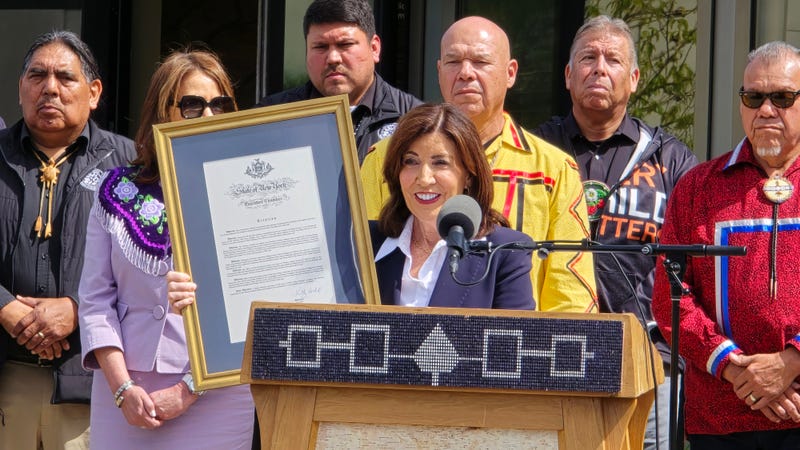
Irving, N.Y. (WBEN) - New York Governor Hochul met with Seneca President J. Conrad Seneca and survivors of the Thomas Indian School to apologize for the state’s role in its operation.
From 1875 to 1957, New York State attempted to assimilate Native children by removing them from their families and culture and placing them in the Thomas Indian School, where they were subjected to abuse, violence, and, in some cases, death.
"In order to avoid repeating the sins of the past, we will acknowledge as a state the role we played. The path is not always easy moving forward, but it must include the collective movement to reclaim dignity and the ancestral legacy. It must include the telling of the truth and what happened at that school, and it must include repatriating those who are lost, and it must include a cultural revitalization and justice. It must include the healing practices and spiritual ceremonies that were shunned for so long. I will play my role," Hochul stated.
Hochul presented President Seneca with a state proclamation formally outlining her apology.
I want this forever enshrined, visible to the rest of the state that this day occurred, and I will say, long overdue. I'm here two months after I was asked. Other governors should have preceded me, but here we are today, and I'm honored and privileged to be the governor of a state that has such a rich history because of the people who are here today and those who came before, for we indeed are on their lands."
Seneca says the governor showed compassion by acknowledging the lasting impact and taking responsibility on behalf of the state.
"It's significant for me, because my father was at the Thomas Indian School. We're here on the Cattaraugus territory. My father was former president of the Seneca Nation. We're in a building that was dedicated in his honor back in 1985 and this is sacred ground that we're on, the atrocities that occurred here all those many years ago, and for the governor to come and apologize on behalf of the state for what happened here, I think offers the opportunity for us to continue that process of healing. I think it also shows that this governor has compassion and cares about the our people, the Seneca people, as she said, she's from this area," stated Seneca.
But some tribe members are skeptical of the goodwill gesture.
Lori Quigley, a Niagara University professor whose mother attended the Thomas school for 10 years as a young child, said she hopes the governor offers more than words.
“An apology is one thing,” she said by phone ahead of the visit. “What actions is she going to take in acknowledging this? These traumas are still impacting our communities.”
Originally established by Presbyterian missionaries in 1855 before the state took ownership in 1875, the Thomas Indian School was among more than 400 government-supported schools established throughout the country with the goal of assimilating Native American youths.
But the schools, which operated for roughly 150 years, had a devastating impact on Native American communities. Staff at the schools worked to strip Native children of their traditions and heritage. Teachers and administrators cut their hair, forbade them from speaking their own languages and forced them into manual labor.
Students, forcibly separated from their families, endured torture, sexual abuse and hatred from school officials. More than 900 children died at the schools, the last of which closed or transitioned into different institutions decades ago.
Former President Joe Biden in October 2024 visited the Gila River Indian Community in Arizona to formally apologize to Native Americans for the “sin” of the nation’s government-run boarding school system.
But at least $1.6 million in federal funds destined for research projects on the boarding schools have been among the casualties of President Donald Trump’s efforts to rein in the federal bureaucracy.
Tribe officials say Hochul’s visit appears to be the first by a sitting New York governor to the federally recognized tribe’s lands.
“No words or actions will ever be able to undo the pain and suffering of the Seneca people and other Indigenous peoples across the State, but by visiting the Seneca Nation and the site of the Thomas Indian School we will mark a new day in our relations,” Hochul said in a statement Friday.
